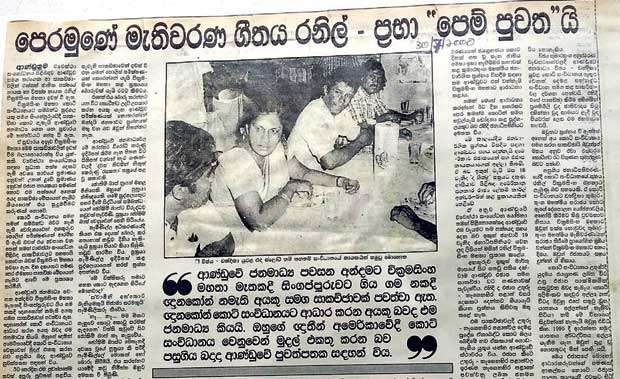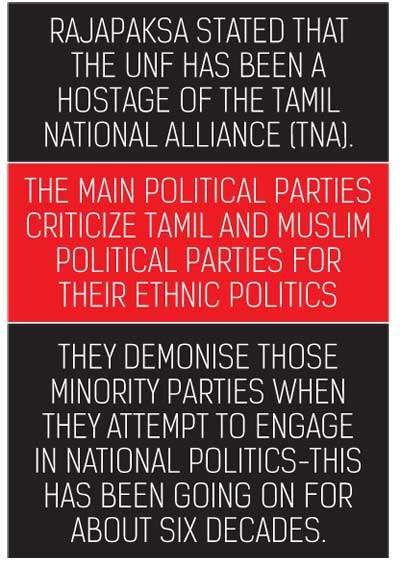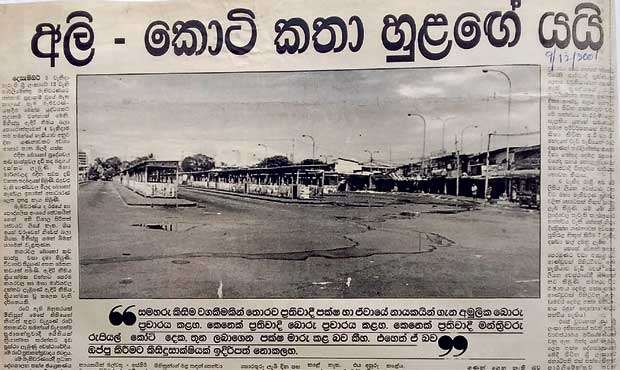Reply To:
Name - Reply Comment
Last Updated : 2024-04-19 22:36:00

Of the twin crises that engulfed the country for 51 days with the unseating of Ranil Wickremesinghe as Prime Minister and the replacing of him with Mahinda Rajapaksa on October 26, the Constitutional crisis has ended with Rajapaksa’s resignation as Prime minister on December 15 and the swearing of Wickremesinghe on the next day.
However, the political crisis that had overlain the Constitutional gridlock still continues. As an extension of it, the legality of Rajapaksa’s Parliamentary membership, as well as his newly gained Opposition leadership, have been challenged.
As the speech made by President Maithripala Sirisena at Wickremesinghe’s swearing-in ceremony on Sunday indicated many more clashes are to come between the Executive Presidency and the Parliament.
When Rajapaksa resigned as Prime Minister on December 15 the UNF leaders argued that he did not have a post to resign from as he had already been ousted from the Premier post on November 14 and 16, through two no-confidence motions.
The argument was logical. However, their leader, Wickremesinghe who claimed that his sacking from the post of Prime Minister was illegal and that he was still the Prime Minister was sworn in as Prime Minister on last Sunday. Why should a Prime Minister be sworn in for the same post again?
Some time back, Junior Vikatan, a magazine published in Tamil Nadu carried a story about a divorce ceremony in the State. The magazine said that it was the first of the kind.
Likewise, for the first time in history, we witnessed a resignation ceremony last Saturday. Rajapaksa at a ceremony at his residence to sign his letter of resignation from the Premiership said he decided to resign as he couldn’t go for a general election forthwith.
And he said that some people went before the court in the name of democracy to prevent a General Election being held. During his speech at Wickremesinghe’s swearing-in ceremony, President Sirisena too while giving vent to his anger and frustration over the Supreme Court’s rejection of his decision to dissolve the Parliament, expressed the same view.
They were attempting to mislead the country and the world. Nobody went before the court to prevent a mid-term election, though an election would have been the result had the Supreme Court upheld the President’s decision to dissolve the Parliament.
It was against that unconstitutional decision of the President that 13 Fundamental Rights petitions had been filed.
Besides, the Janatha Vimukthi Peramuna (JVP), one of the petitioners had stated that they would bring in a motion in the House requesting the President to dissolve Parliament, once the Constitutional conundrum was resolved.
 In fact, had the intention of the President and Rajapaksa been to go for an early election, the former should have dissolved Parliament straight away, without taking pains to unseat Wickremesinghe, appoint Rajapaksa the Prime Minister and to prorogue the Parliament.
In fact, had the intention of the President and Rajapaksa been to go for an early election, the former should have dissolved Parliament straight away, without taking pains to unseat Wickremesinghe, appoint Rajapaksa the Prime Minister and to prorogue the Parliament.
Even then the same Constitutional and political quagmire would have engulfed the country, but his intention would have explicitly been seeking a fresh composition of the Parliament.
When Rajapaksa was appointed Prime Minister, neither he nor the President did say that they would go for a premature Parliamentary Election.
They did not utter a word about an immediate election during the prorogation period either. It was after they realized that Rajapaksa could not muster sufficient support to command the majority power in the House that they wanted a mid-term election.
President Sirisena had two objectives in this manoeuvre.
One was to get rid of the administration of Wickremesinghe who had been ignoring the President and was acting as he pleased in dealing with the affairs of the country.
Secondly, the President who feared a political comeback of Rajapaksa was craving for a patch up with Rajapaksa later, when the latter’s party swept the electorate at the February 10 Local Government Elections.
On the other hand, Rajapaksa was eagerly awaiting an opportunity to reverse the legal actions against some of the members of his family and several of his loyalists.
He wanted power at least for a short period for this purpose. This was clear by the transfer of a senior CID official who had been handling the cases against Rajapaksa loyalists, soon after Rajapaksa was appointed Premier.
The October 26 Constitutional coup was the tryst of those political as well as personal goals of the duo.
Rajapaksa during his speech at the resignation ceremony stated that the UNF has been a hostage of the Tamil National Alliance (TNA).
In a practical sense, his argument was correct as the UNP Government has been installed on the crutches of the TNA which can pull the carpet under Wickremesinghe’s feet anytime.
A Tamil newspaper quoted the Deputy Chairman of Committees of the Parliament and the leader of the Tamil Eelam Liberation Organisation (TELO), Selvam Adaikkalanathan as saying that TNA would topple the Government if the UNP leaders went back on their words with respect to the immediate issues affecting the
Tamil people.
However, Rajapaksa’s intention was not to point at the weakness of the Wickremesinghe Government but to bolster his support bank among the Sinhalese by highlighting the ethnic aspect of the nexus between the UNF and the TNA.
In other words, he was rousing racism among the Sinhalese.
However, it must be remembered that Rajapaksa solicited support for his recent Government from the TNA during a discussion he had with TNA leader R. Sampanthan.
Earlier the leaders of the Sri Lanka Podujana Peramuna (SLPP) led by Rajapaksa have been rousing racism among the Sinhalese by saying that the UNP was being controlled by the TNA, citing an incident in Parliament.
Both the main political parties who criticize Tamil and Muslim political parties for their ethnic politics demonise those minority parties when they attempt to engage in national politics, aligning with their rivals.
This has been going on for about six decades. UNP demonized the Banda- Chelva Agreement in 1957 and the SLFP did the same when the Dudley- Chelvanayakam Pact was signed in 1966.

The JVP described J.R. Jayewardene Government as JR-Thondaman Government, despite Soumyamoorthy Thondaman hanging on to a Government that had 140 out of 168 seats in Parliament.
In the 1990s and in 2000, the UNP had been accusing the Chandrika Kumaratunga Government that it was attempting to divide the country through various devolution schemes and the SLFP and the JVP were agog with an Ali-Koti Givisuma (Elephant-Tiger Pact) after 2000.
It must be remembered that Tissa Attanayake who crossed over to Mahinda Rajapaksa camp in 2014 was in hot water after producing a purported clandestine agreement between the Opposition’s common candidate Maithripala Sirisena and TNA.
Now, again the Rajapaksa camp is harping on another secret agreement. Sheer shamelessness has been the common trait of these accusers of secret pacts.Despite the UNF having managed to form the Government again after 51 days, it is a highly volatile Government, firstly, due to its weak support base
in Parliament.
Secondly, now it has to work with an unpredictable and hostile President, who is constitutionally the head of the Cabinet, while openly teaming up
with the Opposition armed with nationalistic slogans.
The President also has started to toe the same nationalistic line.
SLPP and the two main parties in the government (UNF and the SLFP) received an almost equal number of votes at the February local government elections.
Given the fact that the SLFP has now teamed up with the SLPP, and with the possibility of economic issues further biting, the UNF would have to face a difficult situation at the next national level elections, despite the boost it gained through the recent Constitutional and political impasse. Therefore an early election would be better for the UNF as well.

Add comment
Comments will be edited (grammar, spelling and slang) and authorized at the discretion of Daily Mirror online. The website also has the right not to publish selected comments.
Reply To:
Name - Reply Comment
On March 26, a couple arriving from Thailand was arrested with 88 live animal
According to villagers from Naula-Moragolla out of 105 families 80 can afford
Is the situation in Sri Lanka so grim that locals harbour hope that they coul
A recent post on social media revealed that three purple-faced langurs near t